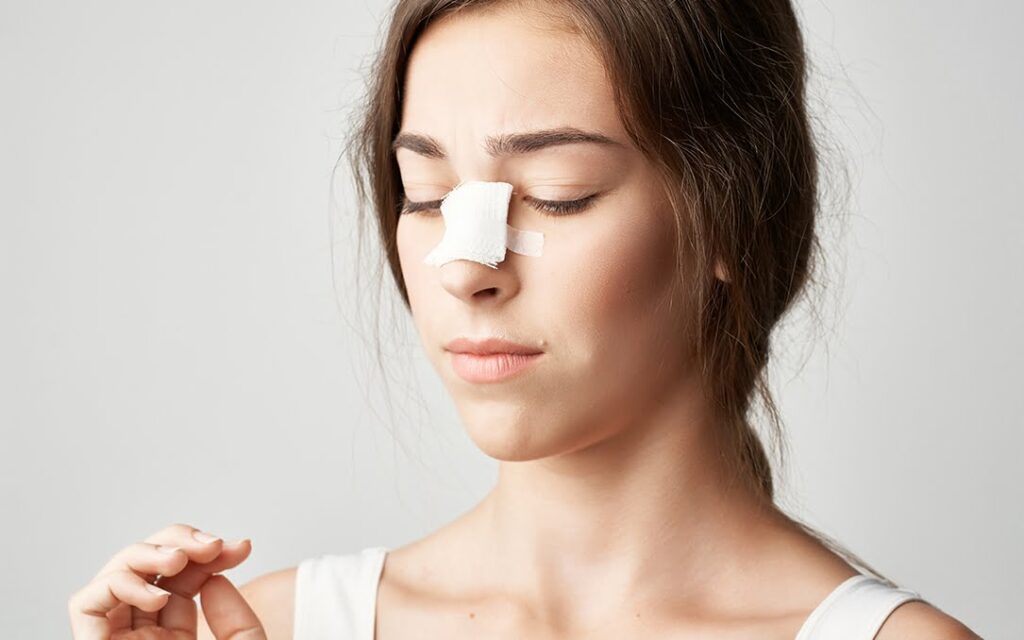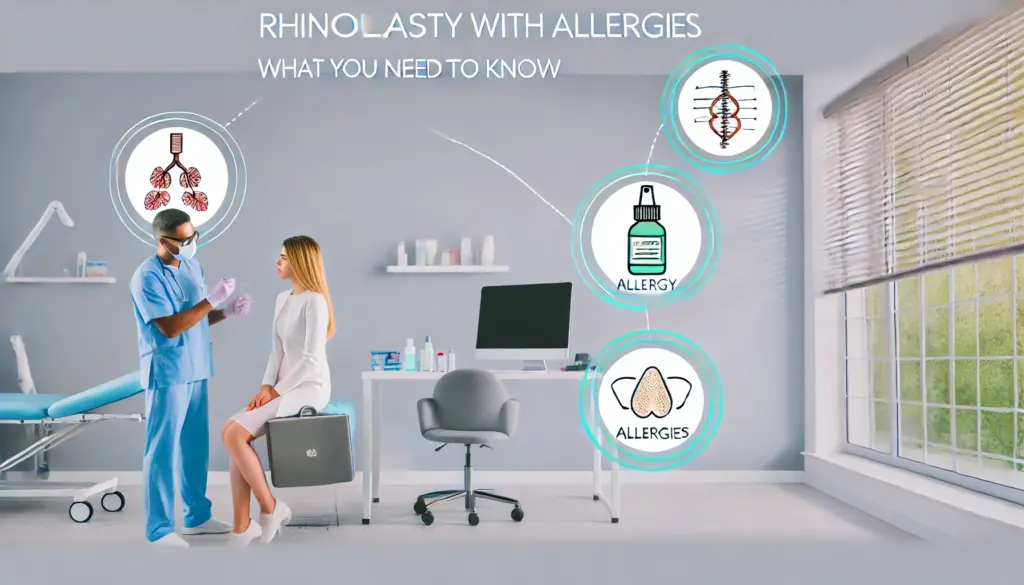Rhinoplasty is not contraindicated by allergic rhinitis. Allergies won’t impair the rhinoplasty surgical techniques, but post-surgical swelling can exacerbate symptoms of allergic rhinitis, such as runny nose and postnasal drip, potentially making recovery more difficult. This blog explores the relationship between allergies and rhinoplasty, giving you the information you need to make decisions about the health of your nose and desired appearance!
Table of Contents
Can Surgery Improve Breathing Difficulties? Understanding Allergies & Rhinoplasty:
Let’s explore the connection between allergies and rhinoplasty, understanding how the procedure can address underlying structural issues that contribute to allergy symptoms.
Many allergy sufferers experience a constant battle with congestion, difficulty breathing, and a runny nose. These symptoms often stem from structural problems within the nose, specifically a deviated septum or enlarged turbinates.
- Deviated Septum: Imagine the septum as a wall dividing your nostrils. When this wall is misaligned, it can significantly obstruct one or both nasal passages, hindering proper airflow. This obstruction can worsen allergy symptoms by making it harder for mucus to drain and hindering the body’s natural filtering process.
- Enlarged Turbinates: These are small, bony structures lined with tissue within the nose responsible for filtering air, regulating humidity, and adding warmth. During an allergic reaction, these turbinates can become inflamed and swollen, further impeding airflow and causing congestion.

Rhinoplasty Can Address the Structural Issues That Contribute To Allergy Symptoms.
By correcting a deviated septum (septoplasty) or reducing the size of enlarged turbinates (turbinoplasty), the procedure can improve nasal airflow and drainage. This can lead to significant benefits for allergy sufferers:
- Reduced Congestion: With improved airflow, the constant feeling of a stuffy nose can be significantly alleviated.
- Easier Breathing: By correcting structural blockages, rhinoplasty can make breathing, especially during allergy flare-ups, feel less labored.
- Enhanced Drainage: Improved drainage of mucus can help prevent infections and minimize the postnasal drip that often accompanies allergies.
It’s important to realize that allergies cannot be cured by rhinoplasty. The immunological response that underlies allergy symptoms is still the same. However, rhinoplasty can provide a great deal of relief and enhance overall nose function by treating the anatomical problems that aggravate allergy symptoms.
The decision to undergo rhinoplasty for allergy relief requires careful consideration. Consulting a qualified rhinoplasty surgeon with expertise in functional rhinoplasty is vital. They can evaluate your individual anatomy, allergy history, and overall health to determine if surgery is an appropriate option.
Will Allergies Affect My Rhinoplasty Results?
Here, we explore the relationship between allergies and rhinoplasty, addressing potential concerns and guiding you towards a smooth journey.
Open communication with your rhinoplasty surgeon is paramount to a successful outcome. Disclosing a history of allergies, including the type and severity, is crucial information for your surgeon to consider during the consultation and planning stages. This allows them to understand how your allergies might affect the surgery and post-operative recovery. That is why understanding potential concerns is all matter for future procedure :
1. Post-Operative Swelling vs. Allergy Symptoms: One of the main concerns for allergy sufferers is the potential confusion between post-operative swelling and allergy symptoms. Following rhinoplasty, it’s natural to experience some degree of swelling and congestion in the nose. However, with allergies, these symptoms might be more pronounced and accompanied by other allergy-related issues like sneezing, itchy eyes, or a runny nose.
2. Allergy Management Alongside Rhinoplasty: While rhinoplasty can address structural issues that worsen allergies, it doesn’t eliminate the underlying allergic response. Therefore, you might still require allergy medications or treatments like immunotherapy alongside rhinoplasty for optimal symptom control.
3. Minimizing Allergy Impact on Rhinoplasty Results: Experienced rhinoplasty surgeons are well-versed in addressing the potential impact of allergies on the surgical outcome. Here’s how they can mitigate these concerns:
- Pre-Operative Management: Your surgeon might recommend managing your allergies more aggressively before the surgery. This could involve optimizing medication regimens or discussing the possibility of allergy testing and immunotherapy to reduce overall sensitivity.
- Surgical Techniques: During the procedure itself, the surgeon can employ techniques that minimize the risk of post-operative swelling and improve long-term drainage. This can help reduce the likelihood of symptoms mimicking allergies.
- Post-Operative Care: Your surgeon will provide specific post-operative care instructions tailored to your allergies. This might include guidelines for nasal irrigation, managing secretions, and using allergy medications in a way that optimizes both recovery and allergy control.
It’s important to remember that every case is unique. An experienced rhinoplasty surgeon will thoroughly assess your individual needs, including your nasal anatomy, type of allergies, and medical history. This comprehensive evaluation allows them to determine if rhinoplasty is an appropriate approach and, if so, to tailor the surgical plan to minimize the impact of your allergies on the results.

Rhinoplasty Pre-Operative Considerations for Allergy Sufferers:
The cornerstone of pre-operative allergy management lies in achieving optimal control of your symptoms before undergoing rhinoplasty. Consulting an allergist is a crucial first step. This specialist can diagnose the specific allergies you have, assess their severity, and develop a personalized treatment plan. This plan might involve:
- Medication Adjustments: Your allergist might recommend adjusting or optimizing your current allergy medication regimen to minimize symptoms leading up to surgery. This can ensure a more stable baseline and reduce the risk of post-operative complications.
- Allergy Testing and Immunotherapy: In some cases, depending on the type and severity of your allergies, allergy testing and immunotherapy (allergy shots) might be recommended. This long-term approach gradually reduces your overall sensitivity to allergens, offering long-lasting benefits that contribute to a smoother rhinoplasty experience.
You can reduce the likelihood of experiencing issues after your rhinoplasty by properly controlling your allergies before surgery. By doing so, you can facilitate a more comfortable healing process and distinguish between edema following surgery and an allergy flare-up. To further maximize your comfort and well-being, you can collaborate with your allergist and surgeon to figure out safe and efficient ways to take allergy medications while you heal.
Taking these proactive steps before your rhinoplasty allows you to approach the procedure with confidence, knowing you have taken control of your allergies and optimized your chances of a successful outcome.

Essential Post-Operative Care For Rhinoplasty Recovery With Allergies:
Following rhinoplasty, specific care instructions are crucial for optimal healing. While these guidelines are generally similar for all patients, allergy sufferers might have additional concerns. Let’s explore essential post-operative care, addressing how to manage allergies during this sensitive recovery period.
Your rhinoplasty surgeon will provide detailed instructions for post-operative care, including:
- Rest and avoiding strenuous activity: This promotes healing and minimizes swelling.
- Head elevation: Sleeping with your head slightly elevated can help reduce swelling and promote nasal drainage.
- Ice packs: Applying cool compresses to the nose can minimize post-operative swelling and discomfort.
For allergy sufferers, nasal discharge management becomes particularly important.
- Saline irrigation: Regularly cleansing the nasal passages with saline solution helps clear mucus and prevent congestion, a common concern during both recovery and allergy flare-ups.
- Allergy medications: Open communication with your surgeon is vital regarding the use of allergy medications post-operatively. Certain medications might not be suitable during this time. Discussing safe and effective options with your surgeon can ensure you manage your allergies while optimizing your healing process.
You may manage your post-operative care for your rhinoplasty with confidence and achieve the best possible healing results by adhering to these crucial post-operative care instructions and discussing allergy management with your surgeon.
Conclusion: Rhinoplasty Offer Solutions Of Allergies For Aesthetics Nose Fuction
In conclusion, rhinoplasty can offer a unique opportunity for individuals with allergies to improve both the aesthetics and function of their nose. By addressing structural issues like a deviated septum or enlarged turbinates, rhinoplasty can alleviate chronic congestion, improve breathing, and enhance overall nasal drainage. However, achieving a successful outcome hinges on open communication with your rhinoplasty surgeon. Disclosing your allergy history and discussing any concerns allows them to tailor the surgical plan and post-operative care to minimize the impact of allergies.
Furthermore, proactive allergy management before and after surgery plays a vital role in ensuring a smooth recovery and maximizing the benefits of rhinoplasty. That is why, by taking these steps, individuals with allergies can explore the potential of rhinoplasty to achieve not only their aesthetic goals but also a significant improvement in their nasal health and overall well-being.

